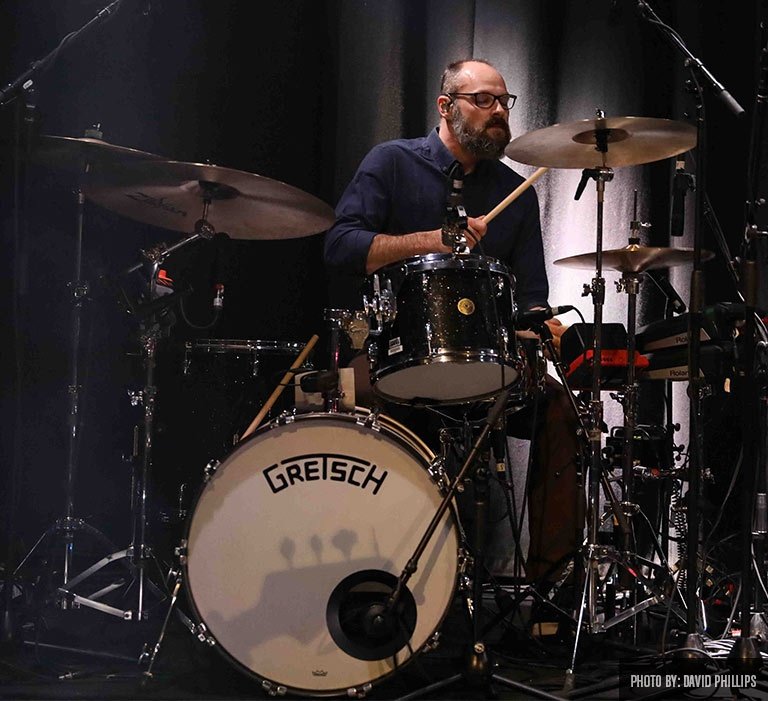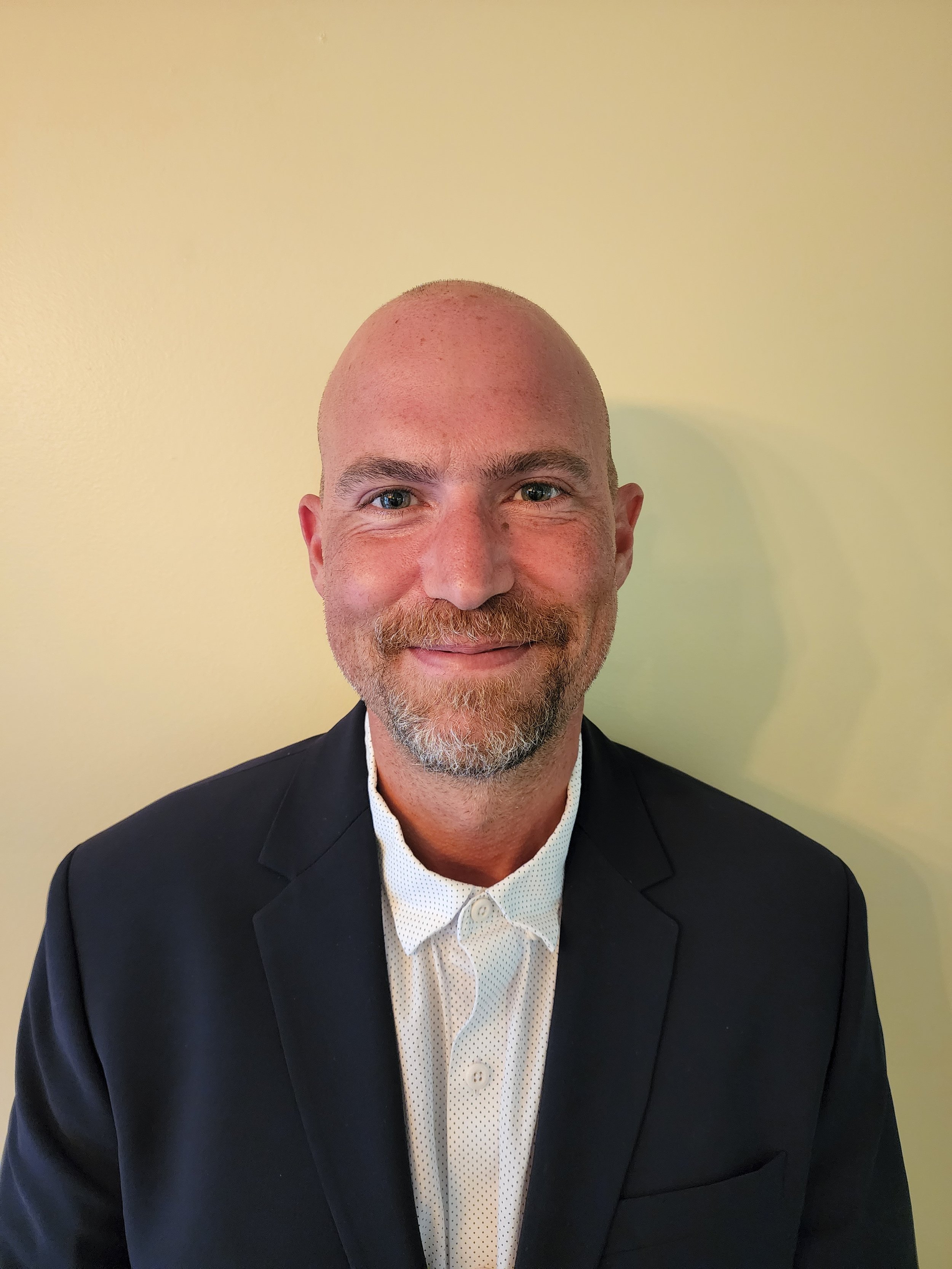break through your drum barriers, develop your own sound, and starting speaking in complete “musical sentences”…
In a supportive GROUP COACHING environment, with me as your LIVE coach 2x per week, direct feedback from ME, and a brand new curriculum designed by ME with the help of dozens of students
enrollment is open for a limited time. just click below to start your no-commitment application.
“listen in” on a real coaching workshop
Wondering what it’s like to be on a live call with me and your fellow students? In this excerpt, I speak with Erik, one of my students, about some challenges he’s having with one of the exercises in the program.
What if you could sound and feel like you wrote things down and practiced them for months…
…when you’re just playing in the moment, off the top of your head?
There’s something I call “the unbridgeable chasm” in drumming. (I’ll tell you in a minute why “unbridgeable” is in scare quotes.)
We spend years practicing rudiments, coordination and licks.
Paradiddles. Stick control. Solo transcriptions. Coordination exercises. Stuff we see on YouTube, Instagram, or Tiktok.
Then we go to play, and what happens? How much of that stuff we practiced do we retain when we’re playing “by feel”, in the moment. Not much.
Instead, usually we feel confined to a small “bag of tricks”, and repeat a lot of the same stuff over-and-over again. That’s fine if we’re just playing a groove (though, as I’ll discuss, that “small bag” is also hurting our ability to play interesting grooves)…
…but whenever it comes time to do a drum fill, that familiar panic sets in. (Benny Greb probably put it most hilariously - “here comes a fill, OH GOD HERE COMES A FILL!”…hilarity ensuing.)
Either you stick to just a few licks you know you can execute reliably, or fear “jumping off the cliff” if you try to invent anything new on the fly.
And forget about playing a solo.
The idea of 16 unaccompanied bars of…JUST….YOU…let alone playing something creative and fun to listen to…causes a lot of drummers simply to refuse to solo.
But great drummers obviously don’t have this issue
Whether it’s fusion drummers like Dennis Chambers or Vinnie…
Or people like Death Cab’s Jason McGerr or Hiatus Kaiyote’s Perrin Moss, great players play with freedom, and creativity…
…yet still sound like they wrote everything down and practiced it.
And it’s not just solos and fills.
Our favorite drummers sound free and creative even when they’re playing grooves. They can change things in real time, without the groove suffering. Add orchestration. Go to the cymbal.
And it’s not just great drummers. I can do it too.
I didn’t used to be able to.
But I practiced for a number of years, and now I can. I still have limitations, of course. But as you can see in the video, I can play simple fills and solos off the top of my head, and still execute them cleanly and clearly. As if I’m speaking a language off the top of my head, and annunciating everything.
And here’s why I bring myself up - if I can do it, so can you.
so what’s the difference?
And why can certain drummers speak in complete musical sentences, without stuttering or repeating themselves, while others feel confined to a small series of things they’ve practiced, which they have to repeat over-and-over?
It’s actually simple: utilizing all that vocabulary we learn is its own separate skill.
And even though now a growing number of players and teachers are reverse-engineering what we do when we play, and figuring out how to construct training simulations that help students bootstrap themselves to fully-improvising (and I don’t just mean solos - I mean playing off the top of their heads)…
…this wasn’t something that traditional teaching, books, DVDs, videos, etc. emphasized much. (With a few notable exceptions.)
In my pretty-educated opinion, this was because many great players had played from an early age, and hadn’t thought about how they did what they did for years.
What’s more, many great players got there just by brute force. It probably is technically true that if you practice 5 hours-a-day for ten years, you’re going to figure out some of these training methods to get licks into your playing.
But until lately, very few of them were going back and finding the…8020…of what they did.
But there’s absolutely a faster way.
I’ve felt it myself.
I used to practice much more of “the old way”. Learning licks or rudiments. Rinse, repeat. Then wait for it to come out in my playing.
Boxers drill their moves in semi-live situations. So why don’t we?
Then, through years of experimentation, I learned some of the systems I teach in this program:
Taking 1-3 little licks and combining them in creative ways, without deviating from the verbatim licks
Learning an “algorithm” that lets me play a flexible set of licks around certain “claves”, or resolution points, to that whenever my brain sees a certain rhythm, my body outputs that flexible lick. (This is hard to explain until you do it.)
Making “loops”, which allow me to improvise something, then “press pause” and workshop it over-and-over, until it’s “perfect”, before moving on to the next loop
And a series of improvisation exercises with constraints, like surfaces, subdivisions, and even “languages”
And now, for a few drummers, I’d like to take you by the hand and lead you across that “chasm”, so you can feel what I’ve felt, and play cogent, creative musical sentences off the top of your head.
And that requires two big things.
the keys to crossing the chasm
The first key is what I’ve just outlined: the system of exercises and “training simulations” designed to bootstrap your brain and body into making complete musical sentences, and playing clean, creative things on the drums off the top of your head.
The second is more subtle.
Because there are materials out there that teach versions of this system I’ve outlined.
But the vast majority of drum students still fail to “break through” the gravity of their current ability level, and come out the other side.
That sounds like a bold claim, so here’s my evidence: published completion rates of self-directed online courses, and my conversations with hundreds of drummers. (The latter is admittedly anecdotal.)
But I invite you to “check” that assertion against your own experience.
If you’re reading this, how many different books, online instructionals, YouTube videos, etc, have you tried?
If some of them were mine, hopefully you felt something like a little bit of progress.
But it’s very difficult to transform your playing “going it alone”, without a ton of discipline, and even if you have that discipline, you’ve got something else working against you.
Let me explain:
The two things holding drummers back
The first, as I’ve said in plenty of other places, is simple follow-through.
We start something new, and we’re super fired-up about it.
Then we hit an obstacle, and all of a sudden that trek to the basement or attic, or garage, to shed the drums doesn’t seem so appealing compared to Netflix, or checking our DMs, or scrolling the latest memes.
So we don’t put in the consistent practice necessary to see a meaningful breakthrough.
(Many times this doesn’t mean we quit practicing altogether. It can mean we just revert from something challenging that will spur growth back to the familiar stuff which feels better, but doesn’t cause us to grow as quickly.)
So consistency and follow through comprise reason number one.
But there’s another silent “progress killer”.
When I see videos of drummers playing my material - there’s no nice way to say this - they’re very often not playing it at a very high level.
Their time will be wobbly.
They’re not getting great sounds out of the drums.
Their stick-heights are all over the place.
Or other times, their playing sounds pretty good, but they’re just doing a few minor things sloppily, which, added together, make their musical thoughts less clear.
And they have no earthly idea. Many times, these videos accompany emails that the exercises are “too easy”.
When I start giving feedback and adjustments to my coaching students, that’s when the progress accelerates a bunch.
They start to “borrow my ears” - to hear their playing as it sounds to me.
Which gives them a much clearer picture of the gap between where they are and where they want to be.
And give the human brain a clear goal, and precisely-calibrated “reps” to get closer-and-closer…
Personal trainers hold us accountable, but they also correct our form and save us from time wasting and injury.
…and it will achieve amazing things.
Collectively, these progress killers point to an obvious solution: a coach.
That’s why I created the 8020 Group Coaching Intensive.
An efficient way to give a coaching experience to a small group of students…
…so I can grab them by the hand, and lead them across the chasm, to playing as if they wrote it down…except off the top of their heads.
what could you accomplish in with me as your coach, giving you individual feedback?
What if you had 2 live group workshops with me every week?
What if you had unlimited feedback on your playing?
What if you had a group of like-minded individuals to support you, and hold you accountable?
And what if you had a brand-new curriculum, developed from the ground-up by ME, with help from dozens of students, to bridge the gap between knowing more vocabulary and actually being able to speak on the drums?
Do you think you could reach your goals with all that support?
Well I'll skip to the end - if this type of live, intensive coaching with accountability, direct feedback from me, and a learning cohort with your fellow students, is what you feel you need to help you break through your drum goals - if I had you at "hello", just click the button below book a quick call with Sal or Seth, our intrepid 8020 admissions folks, to learn way more and see if you're a fit for this open enrollment.
Heard enough?
enrollment is now open for a limited time. use the form below to “hold your slot” by starting your no-commitment application.
watch 2 sample videos from the program - the first is on hi hat coordination
here’s the second sample video - on the “switching exercise”
hear a real student talk about his progress on a live workshop
Imagine if you could ask me about any of your drum challenges live, up to twice-a-week? How much quicker progress do you think you’d make? How much more confidence would you feel about your direction?
what’s in the 8020 intensive coaching program
Okay, let's talk about exactly what you get in the 8020 intensive coaching program.
You get a curriculum that's 10 modules long, with all that material I talked about.
For each concept, there's an introduction, then there are exercises, then at the end of the module, there's a summary of exactly what to practice, with links to all the videos, and written exercises.
There's also a link to submit videos for feedback, which takes us to the second part of the program.
Every student has assigned video homework, which is how I'll keep an eye on your progress and make any adjustments necessary. It's also how I'll give you reassurance and encouragement that will keep you motivated.
And I'm going to live to regret this, but I tell every student they get unlimited video feedback.
Every video is posted in our exclusive Slack group, so students get the accountability of knowing somebody else will see their videos, which helps you develop confidence when you play...
...and every student sees my reply, so you can learn from what I'm telling other people...
...plus you also get encouragement and big-ups from your fellow students.
But the "live" in the "live intensive coaching" bit is this: the live workshops.
Two per week, where you get to get on an hour-long video call with me, to talk through the week's material.
Now everybody asks, "do I need to attend both calls" - no, you don't. I know everybody's got a busy schedule, and if you're able to make one call a week most weeks, that will work fine.
(Of course you're welcome to attend both workshops.)
And that's the final thing: this program is designed for busy people who don't have five hours-a-day to spend on the drums.
it's designed to be done in one hour of practice, around five times-a-week.
Do you feel like a program like this would help you with your drum goals?
Great!
Let's talk about how to sign up.
HOW DO I APPLY?
Sal, 8020 admissions person
Because we only have a few slots available for this program every 3 months…
…and it’s for such a specific drummer, we have an application process.
We want to make sure your goals fit what we do in the program, you’re at the optimal level to get the most out of it, and quite frankly that you’re somebody we’re going to enjoy spending potentially 2 hours with every week.
Seth, 8020 admissions person
You probably want to “vet” us and sound us out as well.
That’s why we have a “mutual application process”: we evaluate each other, and there’s zero pressure or commitment on either side to move forward until we’ve made a mutual decision.
That process starts by booking a 20-30 minute call with Sal or Seth - depending on availability, and answering a few questions.
There is zero commitment to join, and we will NOT hard-sell you at any point in this process, for the very simple reason that we only want to give our limited slots to people who really want to be there.
They’ll will ask you a few questions, tell you more about the program, and let you know about the investment options
You’ll make a mutual no-pressure decision about whether it’s a good fit to move forward
If it’s a “go” on both sides, Seth or Sal will schedule a short call with me, and we’ll make the final admissions decision.
That's it!
IMAGINE YOURSELF IN THIS PROGRAM
What if you had a curriculum laser-targeted at your goals: improvising freely and instinctively on the drums, and enjoying music making without getting up in your head, while at the same time making clear, concise, and "cool" drum beats, fills, and solos.
That sweet spot.
What if you had ME at your disposal live, and to give you individual feedback on your progress?
What if you had an enthusiastic and encouraging community of fellow students to cheer you on as you worked through the material?
And what if you had access to me on live workshops at least once-a-week to answer your questions and give you guidance.
If that sounds like the ticket, just click below to book a call with Sal or Seth, start your application, and learn more.
If you have any interest in this program, I recommend applying, because after this open enrollment, the price will rise by almost $500.






